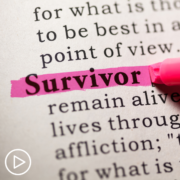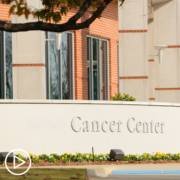Cancer Survivorship | The Positive Impact of Peer Support
Cancer Survivorship | The Positive Impact of Peer Support from Patient Empowerment Network on Vimeo.
Dr. Kathleen Ashton and Erica Watson, a cancer survivor and patient advocate, discuss the importance of giving and receiving peer support for people with cancer and its positive impact.
Related Resources:
 What Does Cancer Survivorship Mean? What Does Cancer Survivorship Mean? |

|
 Navigating Obstacles to Empowerment That Can Lead to Better Health Navigating Obstacles to Empowerment That Can Lead to Better Health |
Transcript:
Katherine Banwell:
Dr. Ashton, what can you tell us about the importance of peer-to-peer support in cancer care and survivorship?
Dr. Ashton:
I think peer-to-peer support is so important for survivors.
It really gives survivors the chance to talk with other people who really understand what it’s like going through this process. So, as a professional I can tell patients the science and give them tools and what works, and their oncologists can tell them what’s important for them to do, but the lived experience is so important. So, in our group program they get some of that peer-to-peer support. And when Erica says, “Hey, it really helped me to bring someone with me to my scan,” a patient really hears that in a different way than when your professional tells them.
So, it’s just that much more meaningful. There’s another program at the Cleveland Clinic called 4th Angel, and it’s a national program that any patient can take advantage of, and it matches you with a peer mentor.
And they often check in by phone with each other, someone who’s been through a very similar experience, and patients often find that incredibly helpful. And many patients that move into survivorship, then they become a mentor and they’re able to help another patient.
And that really feels good to be able to give back in that way.
Katherine Banwell:
Yeah, that’s wonderful. Erica, you have a family history of breast cancer, so you’ve been really vigilant in your care over the years. What advice do you have for other patients and family members facing a cancer diagnosis? Where do you find your strength?
Erica Watson:
Well, I got it from a handful of sources. I learned a lot on my faith. I talked to my family members who were diagnosed with breast cancer and that are currently living. I was not afraid to ask questions. I cried a lot. I just really leaned heavily on my medical team.
I feel like it is so important as Dr. Ashton was saying to be able to reach out or connect with someone that has actually lived the experience, because I was one of those women. I heard it from the medical team, but they were leaning on science, and I needed someone that actually went through what I was going through.
That allowed me to understand and to trust what they were telling me. Not that I didn’t trust my medical team, but the family members or anyone else that I leaned on to support actually lived the life that I was getting ready to live, experienced what I was getting ready to experience. So, that really helped me a lot.
Katherine Banwell:
Yeah. As you navigated care, were there any obstacles or hurdles that you faced?
Erica Watson:
Well, the main one that sticks out to me today was as an African American woman, I didn’t feel as if I had a lot of resources that were catered to me and my needs. And so, that kind of stifled my search for research or for resources, because I didn’t have an experience with women that looked like me, that talked like me, that lived like me, that would have experienced the hair loss like I experienced, my skin changes with the sun.
So, those were the obstacles that I faced, and it was tough. Of course, I had my family to lean on, I have my aunt my sister, but there are so many women out there that don’t have family members that have gone through breast cancer, and I feel so like it’s necessary for us to be able to see and to experience the diversity in that area.
We make up a huge demographic, but we are just not represented the way that I feel like we should.
Katherine Banwell:
Yeah, I absolutely agree. And I know that the medical community is trying to reverse this issue; they’re trying to make it easier and more supportive for people of all colors and races. Why do you think it’s important for survivors to actually be an advocate and help other people as they navigate cancer?
Erica Watson:
I believe the most important reason is just so that they know that they’re not alone. We can, as a breast cancer survivor, I know it was – my first response was to just go into a shell and hide.
I didn’t want to share it with anyone. Of course, my family did not, they would not have understood, and this was before reaching out to my sister and my aunt. But yeah, just so that we’re not alone, to know that there are other women out there that are experiencing and feeling the exact same thing that we are experiencing and feeling; the questions, the concern, the guilt, the fear, we just need to be able to know and connect in that way. So, I just – yeah, I’m so passionate about that, and that’s it.
Katherine Banwell:
Yeah. It’s so helpful to know you’re not alone in how you’re feeling, in some of the symptoms you’re having, to know that other people have experienced the same thing is vital.



